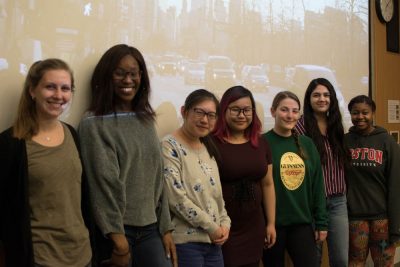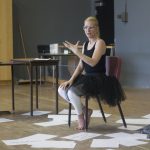
Of the estimated 1.6 million American youth who experience homelessness every year, 40 percent identify as lesbian, gay, bisexual or transgender, according to the True Colors Fund. “A Road to Home,” a 2015 documentary that takes place in New York City, features six of these kids.
The film follows them as they go about their daily lives, trying to find shelter and food while still going through the struggles of being an adolescent.
REACT to FILM BU hosted a screening of “A Road to Home” at the College of Arts and Sciences Thursday night, followed by a discussion with club members about their reactions to the film and what BU students can do to help young LGBTQ people who suffer from homelessness in Boston.
“It’s so easy to stay in the BU bubble – it’s easy to not deal with the important things, to turn a blind eye,” said Michelle Yee, a junior in the College of Communication and vice president of REACT to FILM BU. “The first step is acknowledging privilege.”
REACT TO FILM BU’s president, Jane Zhao, a senior in CAS, said she thinks it’s important for BU students to educate themselves about social issues happening all around the world.
“We put on different documentaries about different social and political issues – usually social justice topics – to not only bring better awareness about these issues to the BU community, but to provide spaces where we can foster discussion within the student body,” Zhao said.
Thomas Byrne, an assistant professor in the School of Social Work, said he believes students have an important role to fill as Boston community members.
“Being a good neighbor and member of a community means working to make sure that everyone in the community has a shot at living a dignified and fulfilling life,” Byrne wrote in an email. “That is hard to do if you lack access to safe, stable and adequate housing, and so BU students should be invested in this issue.”
The club chose “A Road to Home” because they hadn’t yet shown a film about the LGBTQ community, and Zhao thought it would be a good way to learn about intersectional activism.
“This film was, in my opinion, really interesting, because it focused on that intersection between gender, sexuality and homelessness,” Zhao said. “And I think having films about the intersections of those issues is really vital because it expresses the reality.”
Elizabeth McGrath, a CAS freshman, said watching documentaries is a great way to educate young people about these kinds of social justice issues.
“People our age, we watch videos way more than we buy a newspaper or watch the news, so it’s a really important way to reach people because this is what we actually pay attention to,” McGrath said.
Zhao agreed that compared to other forms of news media, documentaries can be especially appealing because of their visual nature.
“[It’s] a really unique way of telling people’s stories and bringing people into an issue and helping people care about it,” she said. “It can be a lot easier to get involved and learn about an issue you might not have known anything about before if you’re watching a really engaging documentary about it.”
After Thursday’s screening, Zhao led a discussion among attendees and club members about the impact the documentary had on them.
Erin Billings, a COM senior, said the film challenged stereotypes she had about people experiencing homelessness. One subject that Billings said stuck out to her was a college student who lived in a women’s shelter while still earning her associate’s degree.
“It’s hard enough to go through college in general when you have a family and a home,” Billings said. “It was very surprising, but it made me grateful.”
“A Road to Home” made CAS senior Alanna Iwuh appreciate just how much she has.
“It’s so easy to ignore all of this and just continue on with your life,” Iwuh said during the post-screening discussion. “You don’t know what people are going through – there’s probably people at BU who, when they leave, they have nowhere to stay.”




